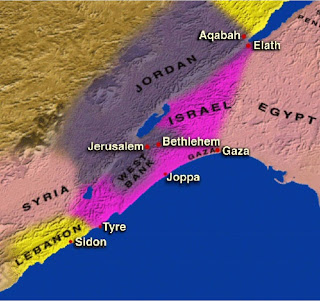The
Messiah and the Davidic Covenant
The Davidic Covenant promised:
1.
An
eternal house (this refers to the dynasty of David; the house of David or the
line of David).
2.
An
eternal throne (this refers to a permanent right to reign that was to be held
by the house of David).
3.
An
eternal kingdom (Israel
4.
An
eternal descendent (necessary if the house, throne and kingdom are to last
forever).
That the Davidic Covenant climaxes
in the person of the Messiah is supported by Scripture. Peter references it in
his address at Pentecost. “Men and brethren, let me speak freely to you of the
patriarch David, that he is both dead and buried, and his tomb is with us to
this day. Therefore, being a prophet, and knowing that God had sworn with an
oath to him that of the fruit of his body, according to the flesh, He would
raise up the Christ to sit on his throne, he, foreseeing this, spoke concerning
the resurrection of the Christ, that His soul was not left in Hades, nor did
His flesh see corruption.” (Acts 2:29-31) Here is the eternal One,
resurrected to sit eternally on the Davidic throne.
In this address Peter draws on Psalm
16 to demonstrate that the resurrection of Jesus was predicted, and since the
Psalm was Davidic it must mean that this One who has been resurrected, the
Messiah of Israel, must also be the One to inherit the throne of David and
reign eternally. Peter builds his case quickly and well. Since he was speaking
on the anniversary of the death of David, and because the tomb of David was
known to his hearers, he confidently asserted that Israel
A later episode is described in Acts
15. There Luke undertakes to report on the debate in Jerusalem
Not only ‘Son of David’ but also ‘King of the Jews’
It was crucial to the Messianic
claim of Jesus that he should have been born in David’s town of Bethlehem
At the centre of the rejection of
Jesus as Messiah was the reluctance of the Sanhedrin to acknowledge this aspect
of the claim of Jesus. When He entered Jerusalem riding on a donkey,
deliberately fulfilling the Zechariah prophecy, “Tell the daughter of Zion,
‘Behold, your King is coming to you, Lowly, and sitting on a donkey, A
colt, the foal of a donkey,’” (Matt.
21:4-5) they complained of the crowd’s reaction when they praised the Son of
David. This public display of power and popularity undoubtedly hardened their
opposition and resistance. Their actions the following week where they sought
opportunity to bring a political accusation against Him were partly a reaction
to this event.
That Jesus had title to the Davidic
throne is clear, but the time when His reign would begin is less clear. The
disciples had thought it was imminent. After the resurrection and before the
ascension they asked the risen Messiah, “Lord,
will You at this time restore the kingdom to Israel Israel Jerusalem Jerusalem







